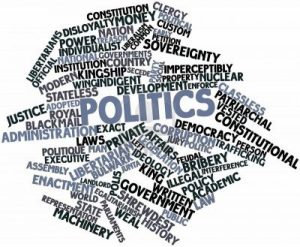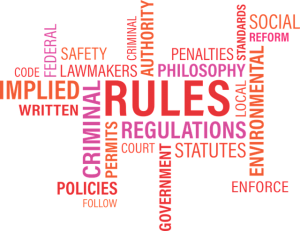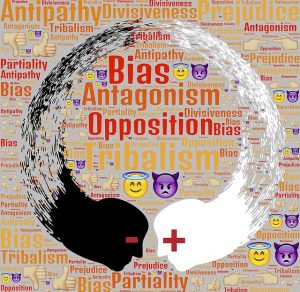 The effect of what has become a particularly nasty political season is beginning to trickle down to the workplace.
The effect of what has become a particularly nasty political season is beginning to trickle down to the workplace.
Comments of the type that we have seen in our political campaigns are being made to employees in the workplace, and the majority of them have been labeled as mere “stray remarks” by courts, resulting in the dismissal of each employee’s resulting discrimination or harassment lawsuit.
The “Stray Remarks” Doctrine …
 Because the courts held that these comments were ambiguous and unrelated to any adverse employment action, the comments could not be used as evidence that the employee worked in a discriminatory environment. This is part of an ongoing trend of courts using the so-called “stray remarks” doctrine to keep employment discrimination claims away from a jury, and in so doing, possibly minimizing and disregarding legitimate evidence of bias.
Because the courts held that these comments were ambiguous and unrelated to any adverse employment action, the comments could not be used as evidence that the employee worked in a discriminatory environment. This is part of an ongoing trend of courts using the so-called “stray remarks” doctrine to keep employment discrimination claims away from a jury, and in so doing, possibly minimizing and disregarding legitimate evidence of bias.
A Cultural Backlash …
 It should come as no surprise that some courts are routinely brushing aside comments like these; we are in the midst of a cultural backlash against anything “politically correct” or deemed overly sensitive to the feelings of women, racial and ethnic minorities, and LGBTQ individuals. The mantra of “people are too sensitive” is repeated often and loudly, especially now that the political campaigns show no signs of changing rhetoric.
It should come as no surprise that some courts are routinely brushing aside comments like these; we are in the midst of a cultural backlash against anything “politically correct” or deemed overly sensitive to the feelings of women, racial and ethnic minorities, and LGBTQ individuals. The mantra of “people are too sensitive” is repeated often and loudly, especially now that the political campaigns show no signs of changing rhetoric.
The PC Police …
 Every day there are new articles lamenting the state of our discourse and complaining that the “PC police” are violating individuals First Amendment rights to say whatever they want. Dismissing these kinds of comments as mere jokes or passing remarks, lionizing those who have the audacity to utter them unapologetically, and classifying those who were harmed by them as overly sensitive, does real damage.
Every day there are new articles lamenting the state of our discourse and complaining that the “PC police” are violating individuals First Amendment rights to say whatever they want. Dismissing these kinds of comments as mere jokes or passing remarks, lionizing those who have the audacity to utter them unapologetically, and classifying those who were harmed by them as overly sensitive, does real damage.
Words and Actions …
 This trend is particularly important to highlight now through the lens of what has become a political anti-PC campaign. Some candidates are praised by supporters for being unapologetically offensive to women and minorities.
This trend is particularly important to highlight now through the lens of what has become a political anti-PC campaign. Some candidates are praised by supporters for being unapologetically offensive to women and minorities.
And as Kareem Abdul Jabbar so aptly pointed out recently, political correctness is not policing. It’s an awareness campaign with the goal of sensitizing people to the fact that their words and actions may be harmful and insulting to others.
The Discrimination That Remains …
 Now that the American workplace has generally made progress in eliminating much of the overt racism and sexism that once barred women and minorities from fully participating, the implicit discrimination that remains is too often ignored or pushed under the rug. If a person’s workplace experience is anything less than enduring constant racial slurs or sexual propositions, the dominant feeling is that it’s not discrimination.
Now that the American workplace has generally made progress in eliminating much of the overt racism and sexism that once barred women and minorities from fully participating, the implicit discrimination that remains is too often ignored or pushed under the rug. If a person’s workplace experience is anything less than enduring constant racial slurs or sexual propositions, the dominant feeling is that it’s not discrimination.
Studies Have Shown …
Yet studies have shown that when women and minorities who experience “soft discrimination” in the workplace – in the form of micro-aggressions, micro-invalidations, or passing comments based on stereotypes – can experience negative mental health consequences that can adversely affect job performance. Thus, passing comments that exhibit implicit discrimination can result in lost job opportunities, lost promotions, and ultimately, lost earnings.
Recognized For What They Really Are …
In short, these comments, and more importantly, the freedom to utter them without consequence, say a lot about a workplace and who it values.
Ignoring their impact serves to further silence those who already do not have an equal say. It is even more important that we recognize “stray remarks” for what they really are: evidence of a discriminatory workplace.
 But until courts and employers realize that these comments can cause real damage, this trend of invalidation and ignorance will continue, and the consequences of pushing this behavior under the rug will endure.
But until courts and employers realize that these comments can cause real damage, this trend of invalidation and ignorance will continue, and the consequences of pushing this behavior under the rug will endure.
And what is the ultimate result of allowing this behavior that we see thriving in the political arena to move into the workplace? A breakdown of workplace cohesiveness and the risk of disruption to productivity of the enterprise.
Disruptive Politics …
Disruptive politics in the workplace can involve employees’ differing opinions about issues of public policy as related to issues like discrimination and race. Not to mention the politics of the workplace itself. While some employees may be distracting one another over the details of the latest Presidential campaign, others may be busy undermining each other’s’ office reputations as they compete for a promotion.
Incompatible Political Views …
 Whether the politics originate in the public sphere or between individuals within the office, they can result in a lack of harmony and cooperation in the workplace.
Whether the politics originate in the public sphere or between individuals within the office, they can result in a lack of harmony and cooperation in the workplace.
Ideally, individuals can separate their political opinions from their work lives, but in the real world some people are unable to do this and they let differing opinions get in the way of effective workplace behavior.
The result can be employees who don’t work well together simply because they hold incompatible political viewpoints.
Compromised Productivity …
Passionate discussion of political issues has its place but can distract workers from the tasks that they should be focusing on. Whether people are agreeing or disagreeing about politics, they aren’t likely to be doing their work when they are discussing politics.
In a worst-case scenario, political discussions grow into ongoing differences of opinion between two groups, something that can result in disruptive feuds that split a workplace into opposing camps.
If ongoing feuds are allowed to develop over a long period of time, the result can be compromised productivity in the workplace, hurting everyone equally, no matter what their political positions.
Easiest Way To Avoid Complex Troubles …
Negative effects for someone who disruptively discusses politics at work can include warnings by management and, in extreme cases, termination.
 Political issues can grow into a complex series of accusations and counter-accusations as employees make claims of free speech and managers respond with charges of poor performance and lack of conscientious work. It may appear that a worker is being persecuted for his political opinions, when in fact the discipline is because he was simply not doing his job.
Political issues can grow into a complex series of accusations and counter-accusations as employees make claims of free speech and managers respond with charges of poor performance and lack of conscientious work. It may appear that a worker is being persecuted for his political opinions, when in fact the discipline is because he was simply not doing his job.
The easiest way to avoid these complex troubles is to save political discussions for outside of the workplace.


